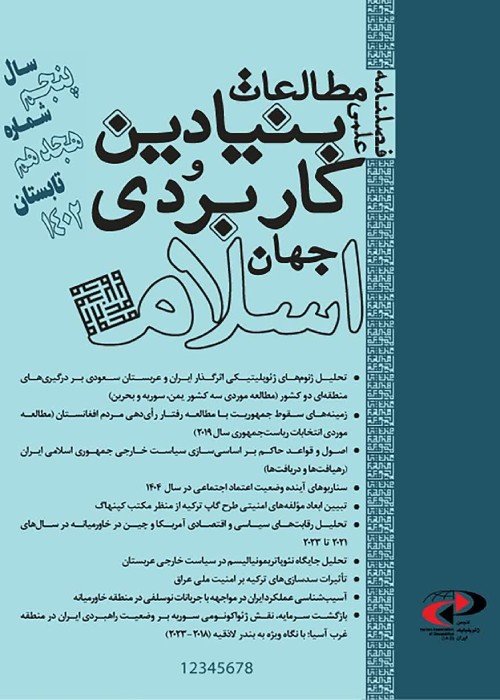Obstacles and challenges influencing the political underdevelopment of Iraq after the overthrow of the Baath party
Iraq is a country with geopolitical bottleneck, suitable geo-economic position, ethnic and religious diversity, and also under the domination of autocratic rulers throughout history. Ethnic-religious gaps along with cultural-social gaps, especially the activation of historical, ethnic, religious, and tribal faults that became possible after the US military invasion of Iraq in March 2003, created a very favorable environment for militant armed groups in opposition to the central government. The social structure of Iraq, like most countries in West Asia, is a mosaic structure consisting of ethnic groups and different sects. This structure with a diverse and heterogeneous demographic structure was the result of the efforts of extra-regional powers and specifically England to break up the Ottoman Empire after the First World War and form new countries with a mosaic social structure and conflicting identities. The policy of assimilation based on the ideology of pan-Arabism, making the government and the army Arab-Sunni, ignoring other groups and ethnic and religious tendencies, and preventing them from entering the field of political power and cultural development based on ethnic-religious divisions caused the emergence of Kurdish ethnocentrism and Shiism became political This resulted in the formation and strengthening of Shiite and Kurdish groups against the central government and their continuous struggles. Unfortunately, the process of democratization in Iraq showed that the elections and political approaches of the Iraqi people are mostly organized based on identity and ethnicity, and other social institutions are not powerful and comprehensive enough to cover this gap beyond ethnic-sectarian groupings give The authoritarian political structure that has always ruled in these countries has insisted on the rejection of social and political freedoms and the formation of groups, each of which can play a role in the education and growth of the society, and has prevented the process of change towards a multi-vocal society. One of the most important challenges in Iraq after the departure of the occupiers is the competition of ethnic groups and religious groups to take over seats in the parliament and government and important political positions, which has led to a serious competition and conflict between the groups and their supporters, and these disaffected groups, the majority of which are also armed, from time to time launch military operations against each other and cause serious problems for the security of the citizens. Investigating why Iraq fell to the sidelines of the political development process and also the role of influential factors in the lack of political development of this country after the overthrow of the Baath party is the main goal of this research. The effort is to find a scientific answer to this question during this exploration. Among the variables influencing the lack of political development, the internal components of this country, including social, cultural, historical mindsets, political and economic factors, as well as the structure and military and security capabilities of the Iraqi government have a major impact. Since the formation of this country, the social structure of Iraq has been based on numerous ethnic-sectarian divisions, which have appeared at different times despite the efforts of the Baathist regime to define a single Iraqi identity The emergence of politics based on ethnic and sectarian identities as the main way of social and political self-definition and as a result the weakening of social cohesion is one of the main characteristics of the new Iraq, which has a fundamental impact on the security of this country. The rise and spread of terrorism in Iraq has complex dimensions that the main factors involved in it can be divided into two categories: internal factors and external factors On the other hand, the internal factors include the tensions between the Kurdistan Region and the central government of Iraq over the disputed areas, the coming to power of the Shiites and the weakening and isolation of the Sunni Arabs, as well as the tribal fabric of the country of Iraq and On the other hand, external factors include: the emergence and presence of terrorist organizations such as ISIS, the American policy in the fight against terrorism, and the different policies and approaches of the regional powers towards the developments in Iraq, including the main factors in the path of political underdevelopment along with the disorder in Iraq after the overthrow of the regime. They are considered the dictator of BaathIn fact, the hypothesis of this research is that the main factors in the lack of political development in post-Saddam Iraq can be divided into two categories of internal factors: war and internal strife for power and the strengthening of politics based on ethnic and sectarian identities, the tension between the Kurdistan region and the central government and On the other hand, external factors include: the emergence and presence of terrorist organizations such as ISIS, the presence of US-led coalition forces, and interventions in the country's political affairs, etc., in the last two decades, have challenged the process of political development after the collapse of the Baath party in Iraq. Sometimes it has stopped The current research is descriptive-analytical in terms of method As a result, moving in the direction of desirable political development can be a fundamental transformation in the political belief of people and institutions of this country, which presupposes changes in culture, economy, and society. Changes in the mentioned fields become a factor for changes in the political field or its consolidation Providing a suitable solution to get out of the impasse of political underdevelopment and not to deviate from the correct path of progress and all-round development in a country with diversity of ethnic groups, religions and different languages like Iraq, without considering all the effective variables, cannot be useful. The correct path of the political development of Iraqi society requires a fundamental transformation in the political belief of the influential religious institutions and individuals of this country, which are presupposed by changes in culture, economy, and society Instead of turning to Western imitation values, which can increase its vulnerability, the modernist cultural efforts can be focused on the concepts of religious transformation, justice, cooperation, and equality, national unity and harmony, forgiveness, and tolerance, tolerance and Different vision in political and social activities along with attention to the patriotic political elites who everyone accepts should rely on free elections in the way of establishing democracy in order to achieve national unity and integrity and like them, most of them have religious, ideological and national roots.
- حق عضویت دریافتی صرف حمایت از نشریات عضو و نگهداری، تکمیل و توسعه مگیران میشود.
- پرداخت حق اشتراک و دانلود مقالات اجازه بازنشر آن در سایر رسانههای چاپی و دیجیتال را به کاربر نمیدهد.




